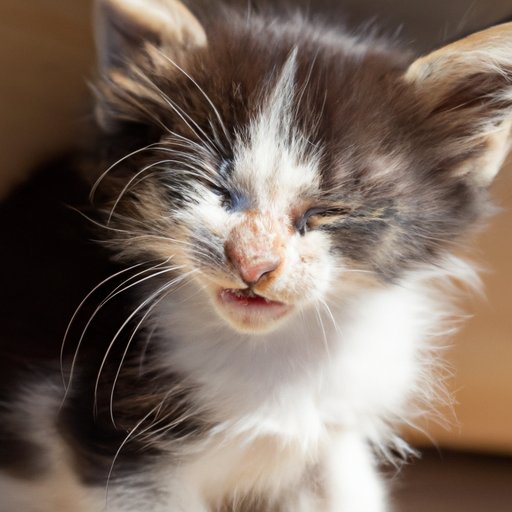I. Introduction
Many kitten owners may have noticed their furry friends sneezing occasionally. While sniffling and sneezing may seem like a minor issue, it could be indicative of bigger problems if left unchecked. It’s important to understand the causes of kitten sneezing to provide the proper care and ensure your kitten stays healthy.
II. The Top 5 Reasons Why Your Kitten Might Be Sneezing and What to Do About It
The following are common reasons why kittens may be sneezing:
- Viral infections: Common viruses such as feline herpesvirus and feline calicivirus can cause sneezing among cats.
- Allergies: Just like humans, cats can also be allergic to a variety of environmental factors such as pollen, dust, or food.
- Environmental irritants: Exposure to cigarette smoke, household cleaners, and other irritants can cause sneezing in kittens.
- Dental issues: Tooth decay, infections, or abscesses can cause sneezing as well as other respiratory problems.
- Nasal mites: These tiny parasites can lurk in your cat’s nose and cause sneezing, discharge, and itching.
It’s important to consult with a veterinarian to determine the specific cause of your kitten’s sneezing. The veterinarian may prescribe specific treatments such as antibiotics or allergy medications depending on the cause of the sneezing.
III. Is Your Kitten Sneezing? Here’s How to Determine if It’s Serious
While sneezing may not always be a concerning sign, certain symptoms may indicate a more serious issue:
- Discharge from the eyes or nose
- Wheezing or coughing
- A decrease in appetite or lethargy
- Fever
If you notice any of these symptoms, it’s important to bring your kitten to the veterinarian as soon as possible. Otherwise, you can perform a quick checklist to determine whether your kitten’s sneezing is serious or not:
- Check to see if your kitten has a clean, clear nose.
- Make sure your kitten is eating and drinking normally.
- Observe your kitten’s energy levels and behavior.
IV. Understanding Feline Respiratory Infections: What You Need to Know About Your Sneezing Kitten
Feline respiratory infections are one of the most common reasons why kittens may be sneezing. Two of the most common respiratory infections are feline herpesvirus and feline calicivirus. These viruses are highly contagious and can spread through direct contact with an infected cat or indirect contact with an object contaminated by an infected cat.
Signs of feline respiratory infections include sneezing, coughing, discharge from the eyes or nose, and fever. If your kitten is diagnosed with a respiratory infection, the veterinarian may prescribe antibiotics or other medications to alleviate the symptoms. Keeping your kitten isolated from other cats until they recover is also important to prevent the spread of the infection.
V. Allergies or Something More? A Guide to Diagnosing Your Kitten’s Sneezing
If you suspect that your kitten’s sneezing is due to allergies, it’s important to differentiate between allergies and other causes of sneezing. Signs of allergies in cats may include:
- Sneezing immediately after contact with an allergen
- Itching and skin irritation
- Vomiting or diarrhea
If you suspect that your kitten has allergies, try eliminating potential allergens from their environment. Consult a veterinarian if the symptoms persist or worsen.
VI. Natural Remedies for Your Kitten’s Sneezing: Say Goodbye to Constant Sniffles
If your kitten is sneezing due to allergies or non-serious issues, there are various natural remedies you can try at home to alleviate their symptoms:
- Saline drops: Saline drops can help to flush out your kitten’s nasal passages and provide relief from congestion.
- Humidifiers: Using a humidifier can help to keep the air moist and reduce nasal irritation from dry air.
- Essential oils: Several essential oils such as eucalyptus and lavender have anti-inflammatory and antibacterial properties that can help to reduce inflammation in the nasal passages.
It’s important to use these natural remedies with caution and to consult a veterinarian before trying any remedies on your kitten.
VII. How to Prevent Your Kitten from Sneezing: Tips for Keeping Your Feline Healthy
Preventive care is key in avoiding sneezing and other common health issues in kittens:
- Provide adequate nutrition: A well-balanced diet is essential for a healthy and strong immune system.
- Keep your house clean: Regular cleaning can help to eliminate dust, mold, and other potential allergens. Vacuuming and air purifiers can also help to keep the air clean.
- Stay up-to-date on vaccinations: Protect your kitten from common illnesses by keeping up with their vaccination schedule.
VIII. When to Take Your Sneezing Kitten to the Vet: Signs It Might Be Time for a Checkup
If you notice any of the following symptoms in your kitten, it’s time to make an appointment with the veterinarian:
- Sneezing that lasts for more than a few days
- Fever or loss of appetite
- Difficulty breathing
- Coughing, vomiting, or diarrhea
During the vet visit, the veterinarian will perform a physical examination and may require diagnostic tests such as x-rays or bloodwork to determine the underlying cause of the sneezing. The veterinarian may also prescribe medication to help alleviate the symptoms.
IX. Conclusion
While sneezing may seem like a minor health issue, it’s important to stay vigilant and understand the potential underlying causes. As a kitten owner, it’s important to take proactive steps to ensure your kitten stays healthy and happy. By being proactive, you can prevent potential health issues before they arise and provide your furry friend with the best possible care.
